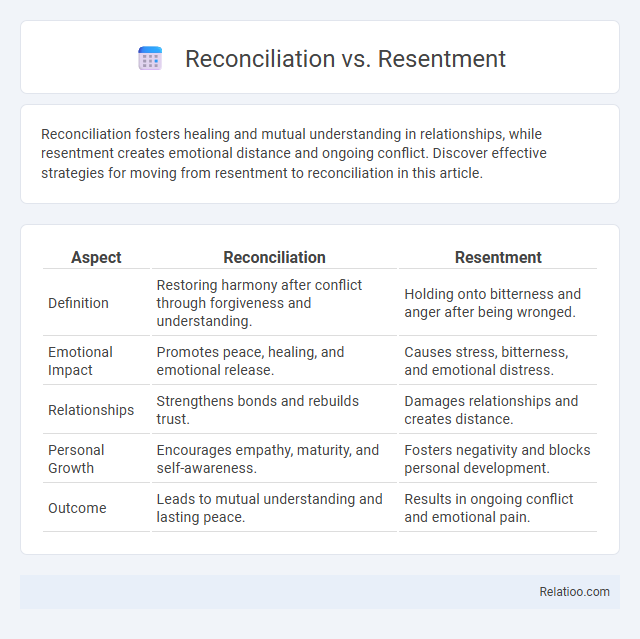Reconciliation fosters healing and mutual understanding in relationships, while resentment creates emotional distance and ongoing conflict. Discover effective strategies for moving from resentment to reconciliation in this article.
Table of Comparison
| Aspect | Reconciliation | Resentment |
|---|---|---|
| Definition | Restoring harmony after conflict through forgiveness and understanding. | Holding onto bitterness and anger after being wronged. |
| Emotional Impact | Promotes peace, healing, and emotional release. | Causes stress, bitterness, and emotional distress. |
| Relationships | Strengthens bonds and rebuilds trust. | Damages relationships and creates distance. |
| Personal Growth | Encourages empathy, maturity, and self-awareness. | Fosters negativity and blocks personal development. |
| Outcome | Leads to mutual understanding and lasting peace. | Results in ongoing conflict and emotional pain. |
Understanding Reconciliation: Definition and Importance
Reconciliation involves restoring broken relationships through mutual understanding, forgiveness, and trust-building after conflict or harm has occurred. It plays a critical role in emotional healing and promotes psychological well-being by resolving feelings of resentment and grudges, which often perpetuate negative emotions and social disconnect. Effective reconciliation requires open communication and empathy, allowing parties to move beyond past grievances and rebuild positive interactions.
What Fuels Resentment in Relationships
Resentment in relationships is primarily fueled by unmet expectations, unresolved conflicts, and perceived injustices that accumulate over time. Emotional neglect, lack of communication, and repeated betrayals intensify feelings of bitterness and mistrust, making it difficult to move toward reconciliation. Holding onto grudges reinforces negative emotions, blocking forgiveness and prolonging the cycle of resentment.
Key Differences Between Reconciliation and Resentment
Reconciliation involves restoring trust and resolving conflicts through forgiveness and mutual understanding, while resentment is characterized by persistent bitterness and unresolved negative feelings toward an offense. A grudge differs from resentment by being a sustained, often passive form of holding a wrong against someone, which can hinder reconciliation. These key differences highlight that reconciliation fosters healing and relationship rebuilding, whereas resentment and grudges maintain emotional barriers and prevent conflict resolution.
Psychological Impacts of Reconciliation
Reconciliation fosters psychological healing by promoting forgiveness, reducing stress, and restoring emotional balance, significantly improving mental well-being. It helps dissolve resentment and grudges, which are linked to prolonged anger and increased anxiety, thereby enhancing your overall emotional resilience. Engaging in reconciliation can lead to healthier relationships and a more positive outlook on life.
The Detrimental Effects of Harboring Resentment
Harboring resentment leads to chronic stress, impacting cardiovascular health and weakening the immune system. Negative emotions associated with grudges increase cortisol levels, which can disrupt sleep patterns and impair cognitive function. Resolving conflicts through reconciliation reduces emotional burdens, fostering mental well-being and promoting healthier interpersonal relationships.
Steps Toward Genuine Reconciliation
Genuine reconciliation requires acknowledging the harm done, expressing sincere remorse, and engaging in open, honest communication to rebuild trust. Each party must actively listen and validate feelings while committing to behavioral changes that prevent future conflicts. Forgiveness emerges as a voluntary, healing process that dissolves resentment and releases grudges, fostering lasting peace and restored relationships.
Barriers That Prevent Reconciliation
Barriers that prevent reconciliation often include deeply rooted resentment, which amplifies emotional wounds and clouds judgment, making forgiveness difficult. Holding a grudge creates a persistent negative mindset that blocks empathy and open communication, essential for healing and rebuilding trust. Lack of mutual understanding, unresolved conflicts, and unwillingness to acknowledge past wrongs further solidify these obstacles, hindering the path toward reconciliation.
The Role of Empathy in Healing and Forgiveness
Empathy plays a crucial role in reconciliation by enabling individuals to understand and validate each other's emotions, fostering genuine healing and forgiveness. It helps dismantle resentment by shifting perspectives away from blame towards compassion and mutual respect. Holding a grudge often stems from a lack of empathetic connection, which impedes emotional resolution and prolongs conflict.
Reconciliation vs. Resentment in the Workplace
Reconciliation in the workplace fosters a positive environment by addressing conflicts through open communication and mutual understanding, reducing tension and promoting collaboration. Resentment, on the other hand, undermines teamwork and productivity by harboring unresolved negative feelings that can lead to disengagement and decreased morale. Prioritizing reconciliation strategies such as conflict resolution training and mediation supports a healthier organizational culture while effectively mitigating the harmful impacts of workplace resentment.
Cultivating a Culture of Reconciliation Over Resentment
Cultivating a culture of reconciliation over resentment involves fostering open communication, empathy, and forgiveness within communities to transform conflicts into opportunities for understanding. Emphasizing reconciliation reduces the negative impact of grudges, which often perpetuate hostility and hinder social cohesion. Implementing restorative practices and promoting emotional intelligence can effectively break cycles of resentment, building stronger, more resilient relationships.

Infographic: Reconciliation vs Resentment
 relatioo.com
relatioo.com